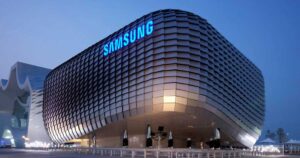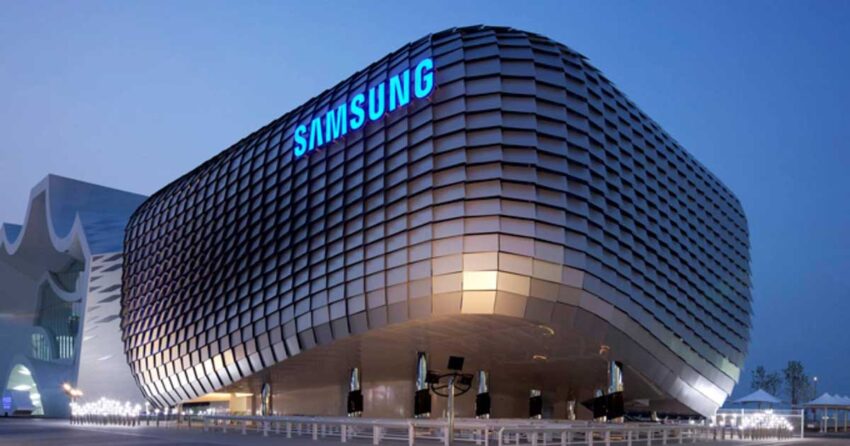Samsung is a South Korean firm that ranks among the biggest manufacturers of electrical gadgets worldwide. Electronics for the consumer and business markets, such as memory chips, digital media players, appliances, semiconductors, and integrated systems, are all areas of expertise for Samsung. It now ranks among the most well-known brands in technology and contributes over 5% of all exports from South Korea.

Early years
Lee Byung-Chull established Samsung on March 1, 1938, as a food trade store. In the beginning, he traded noodles and other items made in and around Taegu, Korea, and exported them to China and its provinces. (The word “three stars” in Korean is where the corporate name, Samsung, originated.) Lee developed the biggest woolen mill in Korea and diversified his company into textiles following the Korean War. He put a lot of emphasis on industry in an effort to aid in his nation’s post-war reconstruction. The Korean government’s new protectionist policies, which were designed to aid major domestic conglomerates (chaebol) by sheltering them from competition and giving them with cheap financing, helped his business during that time.
The corporation bought three of Korea’s biggest commercial banks in the late 1950s, along with an insurance provider, a cement manufacturer, and a fertilizer manufacturer. In the 1960s, Samsung bought a department store, an oil refinery, and a nylon firm in addition to numerous insurance companies.
In an effort to become a more competitive player in the textile market, the firm extended its textile manufacturing techniques throughout the 1970s to encompass the whole production cycle, from raw materials to finished goods. There were the establishment of new subsidiaries, including Samsung Precision Company (Samsung Techwin), Samsung Shipbuilding, and Samsung Heavy Industries. Additionally, the business began making investments in the petrochemical, chemical, and heavy sectors around this time, offering a viable avenue for expansion.
Electronics
In 1969, Samsung launched many electronics-focused departments to make its debut in the electronics sector. Televisions in black and white were their initial offerings. The firm started exporting home electronics items abroad in the 1970s. Samsung had already established itself as a significant Korean manufacturer at the time and had purchased a 50% share in Korea Semiconductor.
Samsung’s technological divisions saw tremendous development in the late 1970s and early 1980s. In 1978 a section dedicated to aircraft was founded, along with other departments dealing with semiconductors and electronics. In order to meet the increasing demand for systems development from enterprises, Samsung Data Systems (now known as Samsung SDS) was founded in 1985. This aided Samsung in rising swiftly to the top of the information technology services market. In order to expand its technological offerings into the fields of electronics, semiconductors, high-polymer chemicals, genetic engineering tools, telecommunications, aerospace, and nanotechnology, Samsung also established two research and development institutions.
Samsung as a global company
Lee Kun-Hee, the son of Lee Byung-Chull, replaced him after his death in 1987. After Samsung was divided into five firms, Lee Kun-Hee continued to head electronics while other sons and daughters of Lee Byung-Chull oversaw the remaining four businesses. Because of its strong position in the South Korean economy, Lee Kun-Hee believed that Samsung had grown stale and was ill-prepared for competition on a worldwide scale. His famous words, “Change everything but your wife and kids,” were directed at Samsung executives. According to Lee, Samsung mandated that employees report inaccuracies to their superiors as part of a “new management” idea. In addition, it opposed bureaucratic methods, elevated women to top management positions, and emphasized the importance of high-quality goods above quantity.
Motivated by Lee Kun-Hee’s transformation of Samsung’s culture, the business proceeded with its worldwide electronics market development in the 1990s. Even though the corporation was successful during those years, it also faced corporate scandals, such as several lawsuits alleging patent infringement and incidents involving bribery. (In one such instance, it was determined in 1996 that Lee Kun-Hee had bought off previous president Roh Tae-Woo. In 1997, the judge mitigated his two-year jail term, and he was granted a pardon.) Even yet, the corporation kept pushing the boundaries of technology and product quality, and several of its technological products—from semiconductors to LCD panels and computer monitors—have risen into the top five globally in terms of market share.
The Samsung Galaxy smartphone series was introduced in the 2000s, and it soon rose to prominence as one of the best-selling smartphones globally in addition to being the company’s most acclaimed offering. In the late 20th and early 21st centuries, Samsung was one of the biggest microprocessor producers in the world, and it also provided the microprocessors for Apple’s initial iPhone models. The firm has been the top-selling television maker in the world since 2006. With the release of the Galaxy Tab tablet computer in 2010 and the Galaxy Gear wristwatch in 2013, the Galaxy series extended to include tablet computers as well. The Galaxy Fold, a foldable smartphone from Samsung, was unveiled in 2019.
Following his indictment in April 2008 on allegations of trust breach and scheme-related tax fraud, Lee tendered his resignation as chairman of Samsung. After being found guilty of tax evasion in July, he received a sentence of three years in prison with a suspended term and a fine of over $80 million. In December 2009, the South Korean government pardoned Lee, allowing him to continue serving on the International Olympic Committee and spearheading the country’s victorious bid to host the 2018 Winter Olympics in Pyongyang.
Executives from the Samsung Group appointed Lee Kun-Hee to lead Samsung Electronics, the conglomerate’s largest subsidiary, in March 2010. He returned later that year in his capacity as Samsung Group chairman. But he had a heart attack in 2014, which rendered him unable to move until his passing in 2020. While Lee held onto his positions, Lee Jae-Yong, also known as Jay Y. Lee, emerged as the Samsung Group’s de facto head.
In 2017, Lee Jae-Yong received a jail term for attempting to bribe Park Geun-Hye, the former president. After his sentence was suspended in 2018, he was freed after serving a year. That suspension was revoked, and he spent January through August of 2021 inside bars before being granted release. Samsung was run by two, and then three, co-chief executive officers while Lee was incarcerated. In 2020, Lee was additionally charged with financial offenses resulting from the combination of two Samsung businesses in 2015. The government said that once Lee took over as CEO of Samsung, the valuations of the two businesses had been altered to ensure his total control over the company.
